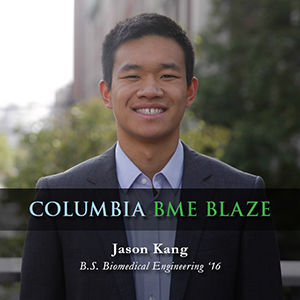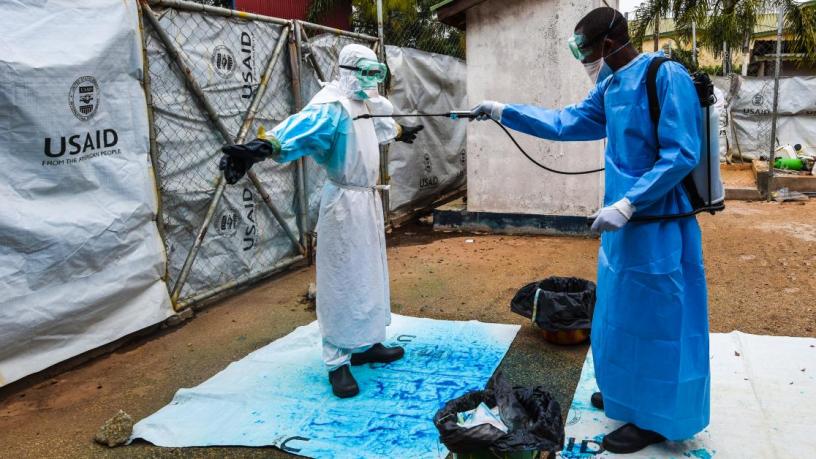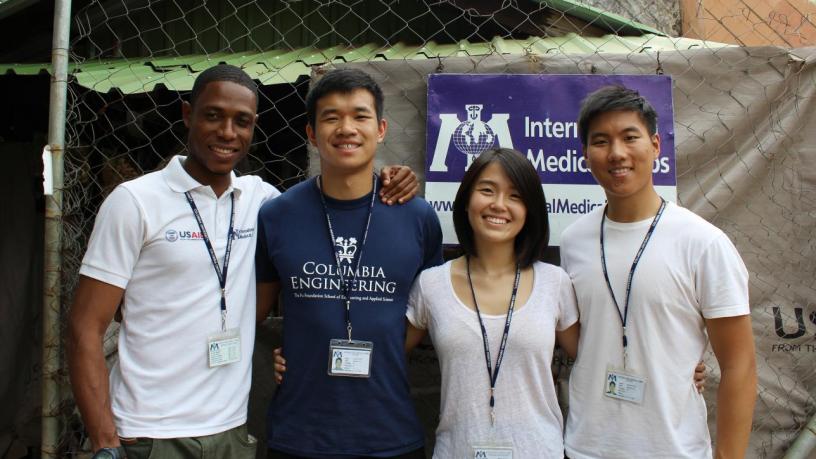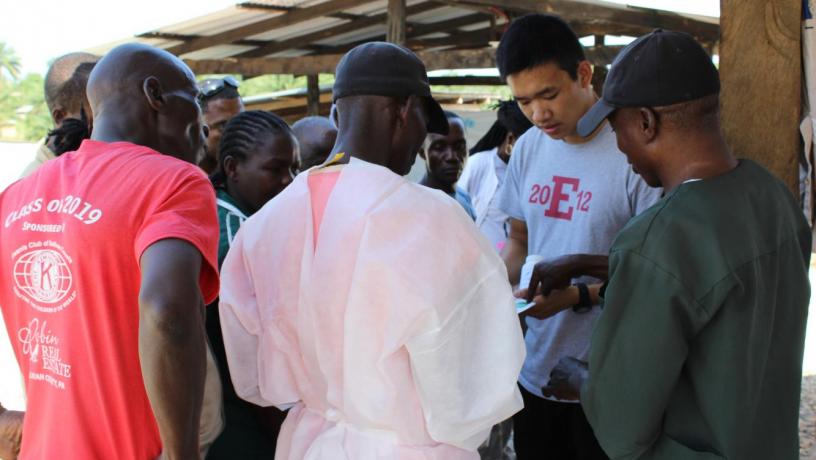April 2020 - BME Blaze: Jason Kang

In this monthly spotlight, get to know the alumni, students, and faculty of Columbia's Department of Biomedical Engineering. Read what our BME folks are up to, from our faculty's latest research, to our students' plans for the future, to our teams' innovations, start-ups and other career successes.
We had the opportunity to catch up with a very special Columbia BME alumnus, Jason Kang (B.S. '16), who is currently aiding in the fight against COVID-19 with his amazing startup, Kinnos, a company he developed with two partners while pursuing his undergraduate degree at Columbia. We were thrilled to hear that Kinnos recently received an additional $6 Million in funding!
Read below as Jason reminisces about his experience as an undergraduate student in the Columbia BME program, offers advice to future BME students, and describes his exciting role as CEO of a successful startup.
Where are you from?
I grew up in North Andover, MA, which is a suburb about 25 minutes north of Boston. Go Pats!
What drew you to the field of Biomedical Engineering?
I was really lucky that I grew up in a household that encouraged a love of science. Maybe I also watched too many superhero movies growing up, but I’ve always romanticized the idea of being able to save lives. To me, Biomedical Engineering is the perfect marriage between my interest in health and medicine and my desire to make a real-world tangible impact.
What is your current role?
I’m currently the Chief Executive Officer and Co-Founder at Kinnos, a venture-backed company that’s pioneering colorized disinfection to protect people from infections. We founded the company as undergrads during Dean Boyce’s Ebola Design Challenge back in 2014. Currently, less than half of critical surfaces in healthcare settings are cleaned properly with a disinfectant, leading to unnecessarily high rates of infection. Although studies have shown that up to 80% of infections could be prevented with better cleaning technique, previous interventions haven’t been able to change human behavior. To solve this problem, we developed Highlight, a patented color additive platform that’s combined with existing disinfectants. Highlight-enhanced disinfectants are colorized so you can easily visualize coverage and never miss a spot, and then the color fades to colorless after a few minutes to approximate in real-time when disinfection is done. By overcoming language, training, and education barriers, we enable a completely untrained person to immediately disinfect surfaces correctly every single time. Proud to say that our technology is used internationally by hospitals, humanitarian agencies, and first responders.
Why did you choose Columbia BME?
When I visited Columbia during high school, I really liked the community I met. I think the most important thing when choosing to go to any school, organization, or job is the people you’ll be surrounded by. I’ll always be grateful that I got to meet my best friends and work with supportive professors at Columbia.
What were some of your favorite projects/memories from the program?
I look fondly back on the BME senior design project because you get to spend time with your friends to build something with your hands. I’ve always found the hands-on and practical side of engineering to be the most fun.
What was your proudest moment at Columbia?
Successfully convincing my girlfriend to date me during freshman year! Thank god I snatched her up early because she’s a catch. We’ve been together for 7 years now and got engaged recently.
How has your experience with Columbia BME contributed towards your goals?
I’m probably not the first Columbia BME alum to say that you cover A LOT of material in the curriculum. While, truthfully, I have to admit I don’t remember a lot of the things we learned, what did stick with me is the ability to learn a lot of new things quickly. As a first-time founder, I’ve run into a billion things I’d never encountered before that I had to learn on the fly, and I credit Columbia BME with giving me the ability to manage that.
What are your thoughts on the strength of Columbia BME's alumni network and how has that influenced your career path?
I actually got my first start-up internship at Jibon Health, which was a spin-out of a Columbia BME senior design project from 2012. When I first got to college, I thought I would eventually go on to get my PhD and work in academia, but working at Jibon completely changed my perspective of the world and how I wanted to live my life. At Jibon, we were able to secure a grant that enabled us to begin clinical trials in Bangladesh on our medical device to treat postpartum hemorrhage. Like most students, I was caught up in the bubble of trying to get good grades and doing extracurriculars, but actually going to Dhaka and working directly with midwives kind of woke me up and made me realize that there’s a much larger world out there beyond Columbia. The act of also creating this medical device and seeing another person benefit from it also made me realize that I wanted to keep building tangible technology.
That being said, I know my experience here was the exception and not the rule. I currently serve as the Career Committee Chair for Columbia Engineering’s Young Alumni Board, and I do think there’s a lot of work we can do to improve interactions between alumni and students to create a tighter community.
Assuming life resumes back to normal after COVID-19, be on the look-out for more informal events between young alumni and students.
Any words of wisdom or tips for prospective BME students?
Don’t underestimate yourself – just because you’re young doesn’t mean that you’re not able to make a difference in the life of someone else. The caveat, of course, is to also have some perspective that you are young and that there’s a lot to learn. Have a small ego, ask for a lot of help (you’ll be surprised at how many people are willing to help you if you say you’re a student and you’re looking for advice), and have an open mind. Proactively ask for feedback from your peers on how you can improve. Find someone older than you to be your mentor and build the type of relationship where you can just vent and talk to them about anything.
And maybe most importantly, when people look back on their time at Columbia, almost everyone I know says the best thing that happened was the friendships they made. Always try to prioritize those relationships and don’t take them for granted.
What are you excited about?
I feel incredibly grateful that I get to work every day on something I find meaningful with a team that I cherish. Especially with the increased awareness about the importance of infection prevention, I’m looking forward to making a meaningful impact on the standard of healthcare.
Columbia BME Academics
Find out more about our BME programs!

Healthcare personnel conduct spray decontamination doffing procedures with Highlight®-enhanced chlorine solution in Conakry, Guinea.

Kinnos team in Guinea.

Liberia demo.
